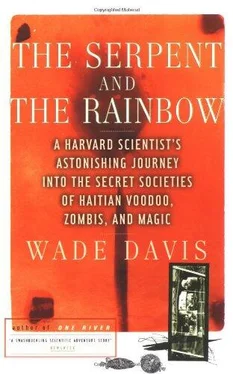Wade Davis - The Serpent and the Rainbow
Здесь есть возможность читать онлайн «Wade Davis - The Serpent and the Rainbow» весь текст электронной книги совершенно бесплатно (целиком полную версию без сокращений). В некоторых случаях можно слушать аудио, скачать через торрент в формате fb2 и присутствует краткое содержание. Год выпуска: 1985, Издательство: Simon & Schuster, Жанр: Старинная литература, на английском языке. Описание произведения, (предисловие) а так же отзывы посетителей доступны на портале библиотеки ЛибКат.
- Название:The Serpent and the Rainbow
- Автор:
- Издательство:Simon & Schuster
- Жанр:
- Год:1985
- ISBN:нет данных
- Рейтинг книги:5 / 5. Голосов: 1
-
Избранное:Добавить в избранное
- Отзывы:
-
Ваша оценка:
- 100
- 1
- 2
- 3
- 4
- 5
The Serpent and the Rainbow: краткое содержание, описание и аннотация
Предлагаем к чтению аннотацию, описание, краткое содержание или предисловие (зависит от того, что написал сам автор книги «The Serpent and the Rainbow»). Если вы не нашли необходимую информацию о книге — напишите в комментариях, мы постараемся отыскать её.
The Serpent and the Rainbow — читать онлайн бесплатно полную книгу (весь текст) целиком
Ниже представлен текст книги, разбитый по страницам. Система сохранения места последней прочитанной страницы, позволяет с удобством читать онлайн бесплатно книгу «The Serpent and the Rainbow», без необходимости каждый раз заново искать на чём Вы остановились. Поставьте закладку, и сможете в любой момент перейти на страницу, на которой закончили чтение.
Интервал:
Закладка:
“Stars, sometimes.”
“When I was small my father took me to a planetarium in New York. You have millions of stars, and your astronomers have even more.” She stood up and walked slowly into the shadow, her words falling away like sparks into the night.
“Look into this sky. We have only a few, and when the clouds come in even fewer. But behind our stars, we see God. Behind yours, you just see more stars.”
Her words saddened me unexpectedly, exposing as they did the gap that lay between me and her people. I gazed down the slope and across the crowded valley alive with twinkling fires, and followed the movements of a torch beam as it climbed erratically toward the crest of a draw. I remembered a recent day when her father and I had been out walking. We had come to a height of land where we could look across a scorched valley stripped to the bone, with haze rising off hot white stones and a few gnarly native trees among the ubiquitous thornscrub and neem. Max Beauvoir had taken a deep breath as if the very sight of such a landscape might bring tears to his eyes—and it probably could have. He had waxed eloquent as if words alone might have squeezed beauty out of that wretched sight, from the wasteland created by years of neglect. It had been extraordinary. I could only think of locusts, he of angels, yet who was the wiser?
Like all contented men, Max Beauvoir had by middle age found his rest. It had not come easily. The son of a bourgeois physician, he had left Haiti as a youth on a remarkable odyssey that led him from the streets of New York to the Sorbonne in Paris and finally to the court of the king of Dahomey. After fifteen years abroad he returned to Haiti, a chemical engineer intent on growing sisal, from which he would extract cortisone. His plantings were barely established when his work was interrupted by the death of a grandfather, a houngan, who from his deathbed instructed Max to take on the mantle of the religious tradition. Soon after, his commercial venture abandoned, Max Beauvoir began a second journey. For five years he crisscrossed Haiti observing the traditional rites, partaking in the pilgrimages and listening to the houngans. Finally, for a spiritual parent he chose an old man from the south and joined the community of his hounfour, eventually becoming initiated as a houngan himself. Into that world he led his wife, a lovely French painter, and perhaps more reluctantly their two daughters. The young girls were teased by their classmates because of their father’s beliefs. At first they had been ashamed, but as they grew older it became their greatest source of pride.
“My father’s great-grandfather had green eyes,” Rachel said, returning to the fire, “and a gold watch. He came from the east, on horseback and with everything he owned stuffed into a calabash that hung around his neck. He could take that watch—it had a mirror on the inside—and just by opening it and staring into the mirror, he would disappear.” She glanced at me, as if uncertain whether I would believe the story.
“He wandered all over the country and finally settled in Petite Rivière de l’Artibonite. He became really important.”
“Aided no doubt by his watch,” I teased.
“Perhaps.” She smiled. “He was a great houngan. He lived for many years, but he knew when he was going to die. Just before, he gave away everything he owned and called together all the family. They found him beneath a great mapou tree, and one by one he called for his grandchildren, including Max’s father. He said something to each one and then he just left.”
“Where to?”
“No one knows. He placed a few things in a saddlebag, and rode away. They say towards the Dominican Republic.”
“That was the end?”
“Yes. Can you imagine? No one ever knew his birthplace or where he died.”
I looked across the fire at her but said nothing. For weeks the two of us had been as blind accomplices inadvertently placed on the same trail pursuing different goals. I was chasing an elusive phenomenon that I scarcely believed in; she sought a sense of place. For she was young, and whether she knew it or not she was torn between two worlds, that of her lineage, which she bore like a weight, and everything that awaited out there beyond the ocean. One knew just by looking at her that she would have to go sometime. She had a hundred precocious ideas, and some were good and true, but they could never be hers until she found them alone, for ideas are but words unless they are sown in experience. At the same time I was drawn to warn her somehow, for hers was a beauty that filled one with a premonition that it could easily become the target of destructive forces. Yet you could not feel sorry for her; her pride forbade it. And moreover, nothing evil had yet befallen her; she lived with the brash confidence of a person who has never lost.
The dusty road to Savanne Carée passes through the old market center of Ennery, with its cobbles and thick-walled caserne and forlorn statue of Toussaint L’Ouverture, then runs along the Rivière Sorcier, crisscrossing a number of affluents before climbing into a high, rolling landscape dappled with mango trees. It is rich land with clusters of white houses, orchards swollen in fruit, and fallow slopes camouflaged by thick grass. Millet grows to the edge of the valley where the fields become broken, and the skirt of the mountain rises to steep cliffs draped in cascading remnants of native vegetation. In the hedgerows there are even wild things, and overhead the odd raptor scrapes the sky. After the barren lands to the west around Gonaives, there is an innocence to such abundance. Yet somewhere in this picturesque valley Ti Femme squandered her birthright and was made a zombi.
Just beyond a crossroads littered with the remnants of the morning market, Rachel and I noticed a young lad prostrate on the stony ground, relaxed as a lizard. He must have seen us at the same time. He leapt to his feet and in an instant was joined by another. As we came nearer, I saw that the first was a small wisp of a boy, with electric eyes and the large head and long limbs typical of many peasant youths. This was Oris. The other was René, and he was younger and clearly subordinate. From that moment on we were four.
“Of course, I know her. The one that passed beneath the ground,” Oris said to Rachel as we made our way along the narrow trail. “She’s the one who died, but her breath of life didn’t leave, it stayed here,” he added, pointing to his armpit.
“They buried her?”
“Naturally, and then at night the person who killed her went to get her.” René was running up and down the trail like a rabbit anxious not to miss anything. Every so often his excitement overflowed in laughter, gay and sparkling.
“Who did this to her?”
“We don’t know,” René said, glancing ahead toward his friend.
“Her aunt,” Oris said matter-of-factly. “Then they put her to work cleaning cornmeal. That’s all she was good for.”
“And the bokor?”
“You can’t know. To find out you’d have to know who killed her.”
“I thought you said the aunt.”
“She had many aunts, and some have died. Besides, nobody cared anyway.”
“What do you mean by that?” Rachel paused, squatting by the side of the trail, her skirt spread out from her waist like a tent. Oris swaggered by her unabashed. A market woman with a healthy corpulence and a lugubrious air was walking up the trail toward us, and Oris didn’t say anything until she had passed.
“Ti Femme was mean. She was doing everything she shouldn’t have done. And she didn’t like people.”
“Why? What did she do?” Rachel asked.
“Well, for example, you don’t do anything and she stands up and swears at you. She swore at people for no reason. But here they kill people for almost nothing,” Oris said casually. “It’s just like the woman in the elections,” he continued, referring to the recent political campaign for the National Assembly. “We didn’t like her. She was ill behaved and had meetings and swore at the children. So we got her. I, myself, voted five times for the doctor. He promised to bring the president’s wife to our lakou.”
Читать дальшеИнтервал:
Закладка:
Похожие книги на «The Serpent and the Rainbow»
Представляем Вашему вниманию похожие книги на «The Serpent and the Rainbow» списком для выбора. Мы отобрали схожую по названию и смыслу литературу в надежде предоставить читателям больше вариантов отыскать новые, интересные, ещё непрочитанные произведения.
Обсуждение, отзывы о книге «The Serpent and the Rainbow» и просто собственные мнения читателей. Оставьте ваши комментарии, напишите, что Вы думаете о произведении, его смысле или главных героях. Укажите что конкретно понравилось, а что нет, и почему Вы так считаете.












